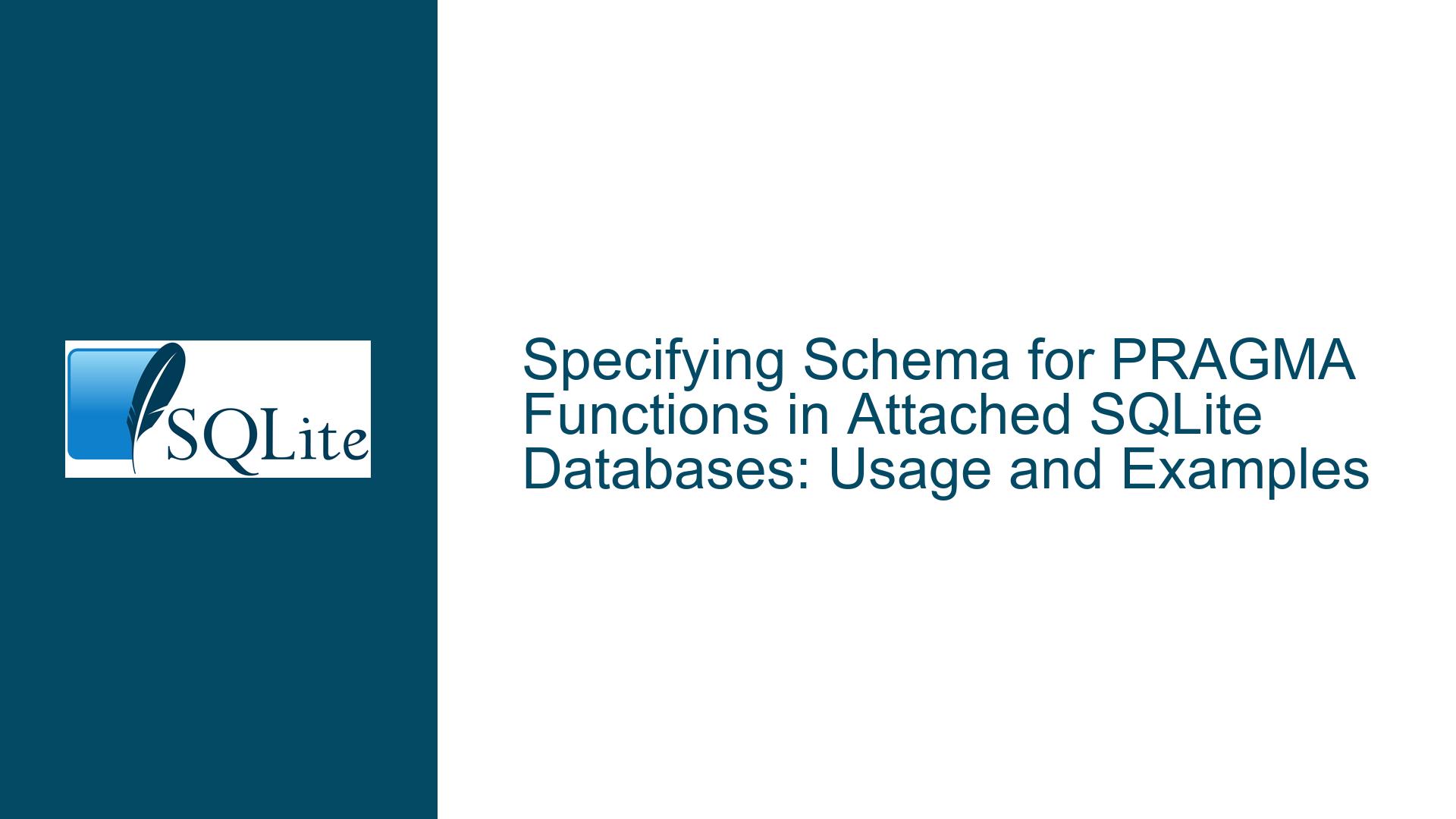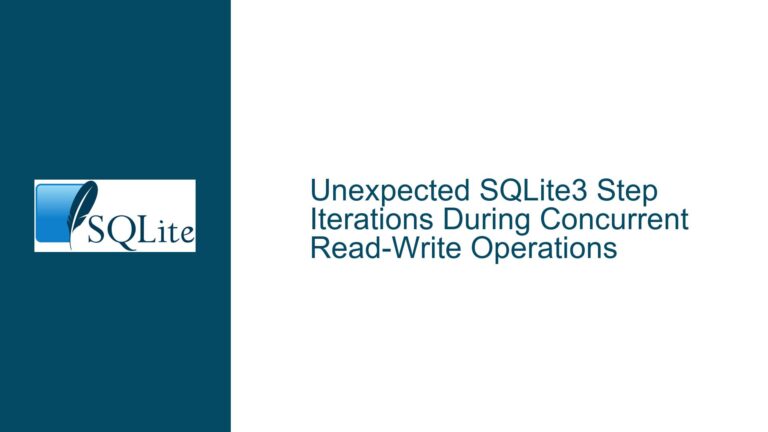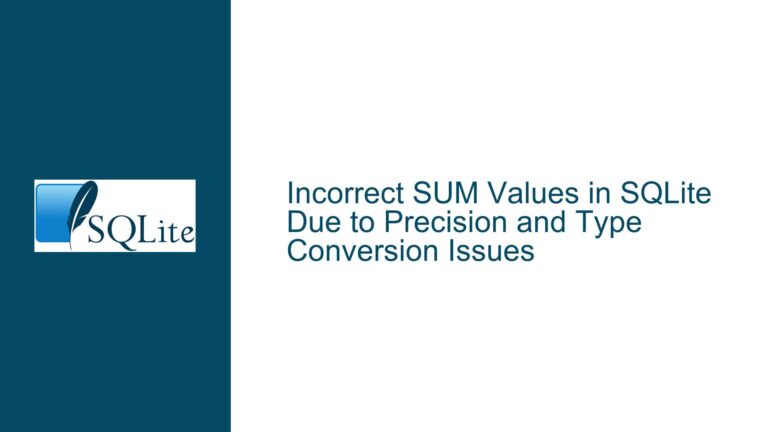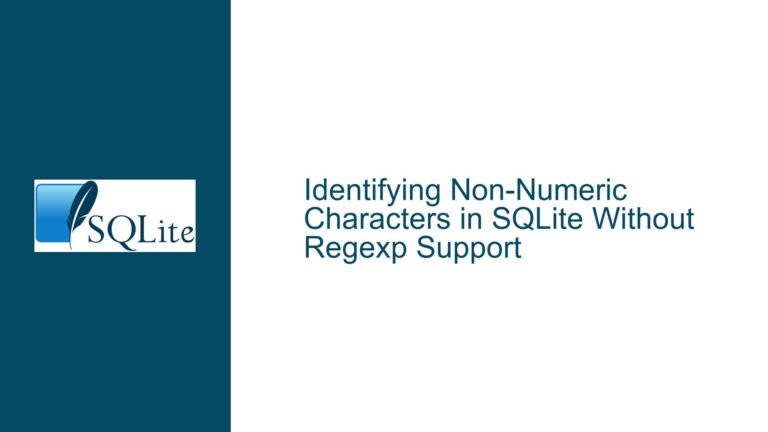Specifying Schema for PRAGMA Functions in Attached SQLite Databases: Usage and Examples
Ambiguity in Schema Specification for PRAGMA Function Syntax and Experimental Status Concerns
Issue Overview
The core challenge revolves around leveraging SQLite’s PRAGMA functions to query metadata across attached databases when the schema (database name) must be explicitly specified. While traditional PRAGMA statements allow prefixing the pragma name with schema. (e.g., PRAGMA main.table_info('t')), PRAGMA functions use a different syntax where the schema is passed as an argument to the function-like pragma call. This distinction is critical for users working with multiple attached databases who need to inspect or compare schema structures programmatically.
The confusion arises from two factors:
- The documentation for PRAGMA functions describes the schema as an optional last argument but does not provide concrete examples of how this interacts with attached databases.
- A historical "experimental" label attached to PRAGMA functions caused uncertainty about their stability, even though this label was removed five years after their introduction.
A practical scenario involves comparing table structures (columns, data types, constraints) across multiple attached databases. For instance, a table t in database foo.db might have one column, while the same table t in bar.db has two columns. Querying pragma_table_info('t') without schema qualification returns metadata for t in the main schema by default, which may not match the user’s intent when working with attached databases. The absence of explicit examples in the documentation forces users to reverse-engineer the correct syntax through trial and error or external forum posts.
Documentation Gaps and Schema Argument Positioning in PRAGMA Function Calls
Possible Causes
- Lack of Explicit Examples for Schema Qualification: The SQLite documentation explains that the schema is an optional last argument for PRAGMA functions but does not illustrate this with real-world use cases involving attached databases. Users familiar with traditional pragmas (e.g.,
PRAGMA schema.table_info('t')) might incorrectly assume similar syntax applies to PRAGMA functions. - Ambiguity in Argument Order: PRAGMA functions accept arguments in a specific order, where the schema is always the last parameter. For example,
pragma_table_info('t', 'foo')specifies the table name first and the schema second. This differs from traditional pragmas, where the schema is a prefix. Misplacing these arguments (e.g.,pragma_table_info('foo', 't')) leads to incorrect results or errors. - Historical Experimental Status Misconceptions: Although the experimental warning was removed from the documentation, users encountering older resources or inherited codebases might still question the feature’s reliability. This creates unnecessary hesitation in adopting PRAGMA functions for critical tasks like schema validation.
- Implicit Default Schema Behavior: When no schema is specified, PRAGMA functions default to the
mainschema. Users unaware of this behavior might inadvertently query the wrong database, especially when working with transient in-memory databases or complex attachment chains.
Resolving Schema Conflicts and Querying Metadata Across Attached Databases
Troubleshooting Steps, Solutions & Fixes
1. Explicit Schema Specification in PRAGMA Function Arguments
To query metadata from a specific attached database, append the schema name as the last argument to the PRAGMA function. For example:
-- Attach databases
ATTACH 'foo.db' AS foo;
ATTACH 'bar.db' AS bar;
-- Query table_info for 't' in 'foo'
SELECT * FROM pragma_table_info('t', 'foo');
-- Query table_info for 't' in 'bar'
SELECT * FROM pragma_table_info('t', 'bar');
This syntax ensures the function targets the correct schema. Note that the first argument is always the object name (e.g., table name), and subsequent arguments depend on the pragma’s requirements. The schema must always be the final argument.
2. Filtering Results by Schema Column
Some PRAGMA functions return a schema column that identifies the source database. This allows filtering results without specifying the schema upfront:
-- Retrieve table_info for 't' across all attached schemas
SELECT * FROM pragma_table_info('t') WHERE schema = 'foo';
This method is useful when iterating through multiple schemas programmatically or validating schema consistency.
3. Comparing Schema Structures Using EXCEPT Clauses
To identify differences between tables in attached databases, combine PRAGMA function results with set operations:
-- Find columns in 'bar.t' not present in 'foo.t'
SELECT * FROM pragma_table_info('t', 'bar')
EXCEPT
SELECT * FROM pragma_table_info('t', 'foo');
This query highlights discrepancies in column definitions (e.g., an extra column v in bar.t). Reverse the order of the EXCEPT clauses to detect differences in the opposite direction.
4. Validating Schema Argument Order and Existence
If a PRAGMA function returns unexpected results:
- Verify the schema name is spelled correctly and matches the alias used in
ATTACHstatements. - Ensure the schema argument is positioned last in the function call.
- Confirm the schema is attached and accessible using
.databasein the SQLite shell.
5. Addressing Legacy Experimental Status Concerns
The experimental label was removed in SQLite version 3.36.0 (2021-06-18). Users should reference the official documentation for up-to-date syntax and confirm their SQLite version with SELECT sqlite_version().
6. Default Schema Fallback Behavior
When no schema is specified, PRAGMA functions default to main. To avoid accidental queries against the wrong schema:
- Explicitly include the schema argument in all PRAGMA function calls.
- Use the
WHERE schema = '...'filter even when querying a single schema.
7. Cross-Schema Metadata Aggregation
PRAGMA functions can be combined with UNION ALL or JOIN clauses to aggregate metadata across multiple schemas:
-- List all columns from 't' in all attached schemas
SELECT schema, name, type
FROM pragma_table_info('t')
WHERE schema IN ('main', 'foo', 'bar');
This approach simplifies tasks like schema audits or generating unified reports.
8. Handling Edge Cases and Errors
- Non-Existent Tables: Querying
pragma_table_infofor a non-existent table returns an empty set. UseCREATE TABLE IF NOT EXISTSor check for existence first withSELECT FROM sqlite_schema WHERE name = 't'. - Invalid Schema Names: Specifying an unattached schema (e.g.,
pragma_table_info('t', 'baz')) results in an error. Validate attached schemas withPRAGMA database_list;. - Case Sensitivity: Schema names are case-insensitive in SQLite but should match the casing used during attachment to avoid confusion.
By systematically applying these solutions, users can eliminate ambiguity in PRAGMA function usage, reliably query metadata across attached databases, and perform advanced schema comparisons with confidence.






